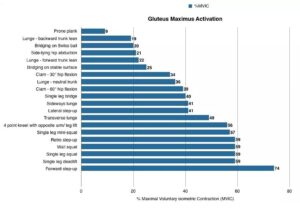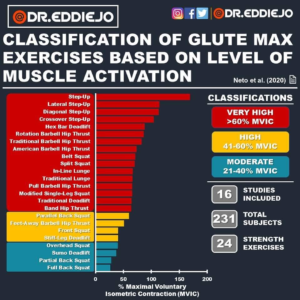FORWARD STEP-UP
GLUTEUS MAXIMUS
– Forward Step-up
Review of studies evaluating gluteus maximus and gluteus medius activation during rehab exercises . Michael Reiman – 2011
Procedure
– Studies that evaluated activation of GMax during rehab exercises; Note: subjects included in this review were healthy
Results for Gluteus Maximus
– the following can affect EMG activity:
(1) trunk position (2) movement direction (3) base of support
– EMG ranged from 74% to 9% MVIC; strength gains are expected for activation levels = or >40% MVIC
· 74% – forward stepup
· 59% to 56% – 1-leg squat; 1-leg RDL; wall squat; retro backward stepup; 1/4 squat
· 49% to 40% – transverse lunge; sideways lunge; lateral stepup; 1-leg bridge
· 39% to 34% – clam 60º hip flexion; lunge neutral trunk; clam 30º hip flexion
· 25% to 19% – bridging on stable surface; lunge forward lean; side lying hip ab-duction; bridging on a Swiss ball; lunge backward lean
· 9% – prone plank
GLUTEUS MAXIMUS
– Forward Step-up
Glute Max Activation during Common Strength and Hypertrophy Exercises – Review – 2020 – Neto
Procedure
– GMax activation levels during strength exercises that incorporate hip extension and use of external load
Results
– the following factors might directly influence GMax activation
(1) External load (2) movement velocity (3) level of fatigue (4) mechanical complexity of the exercise (5) need for joint stabilization
– Step-up may elicit the highest level of Gmax activation possibly due to the stabilization requirement
| Classification | Activation | Exercise | Average (%MVIC) |
|---|---|---|---|
| 1º | Very high | Step-Up | 169.22 ± 101.47 |
| 2° | Very high | Lateral Step-Up | 114.25 ± 54.74 |
| 3° | Very high | Diagonal Step-Up | 113.21 ± 43.54 |
| 4° | Very high | Crossover Step-up | 104.19 ± 33.63 |
| 5° | Very high | Hex Bar Deadlift | 88 ± 16 |
| 6° | Very high | Rotation BB Hip Thrust | 86.18 ± 34.3 |
| 7° | Very high | Traditional BB Hip Thrust | Lower GM: 69.5/Upper GM: 86.7 |
| 8° | Very high | American BBHip Thrust | Lower GM: 57.4 ± 34.8/ Upper GM: 89.9 ± 32.4 |
| 9° | Very high | Belt Squat | 71.34 ± 29.42 |
| 10° | Very high | Split Squat | 70 ± 15 |
| 11° | Very high | In-line Lunge | 67 ± 11 |
| 12° | Very high | Traditional Lunge | 66 ± 13 |
| 13° | Very high | Pull Barbell Hip Thrust | 65.87 ± 23.28 |
| 14° | Very high | Modified Single-leg Squat – Bulgarians | 65.6 ± 15.1 |
| 15° | Very high | Traditional Deadlift | 64.50 ± 41.72 |
| 16° | Very high | Band Hip Thrust | Lower GM: 49.2 ± 26.5/ Upper GM: 79.2 ± 29.9 |
| 17° | High | Parallel Back Squat | 59.76 ± 22.52 |
| 18° | High | Feet-away Barbell Hip Thrust | 51.38±17.93 |
| 19º | High | Front Squat | 40.54 ± 4.73 |
| 20° | High | Stiff-Leg Deadlift – RDL | 40.5 ± 18.8 |
| 21° | Moderate | Overhead Squat | 39.75 ± 29.91 |
| 22° | Moderate | Sumo Deadlift | 37 ± 28 |
| 23° | Moderate | Partial Back Squat | 28.16 ± 10.35 |
| 24° | Moderate | Full Back Squat | 26.56 ± 12.33 |
UPPER GLUTE MAX, GLUTE MEDIUS, TFL
– Forward Step-up
Which Exercises Target the Gluteal Muscles While Minimizing Activation of the Tensor Fascia Lata? – 2013 – Selkowitz
Procedure
– which exercises are best for activating GMed and superior portion of GMax, while minimizing activity of TFL
Fine Wire Electrodes
– Sup-Gmax: superior and lateral to midpoint of line drawn b/n posterior superior iliac spine and posterior greater trochanter
– GMed: 2.5 cm distal to midpoint of iliac crest (ie, middle portion)
– TFL: distal and slightly lateral to anterior superior iliac spine and medial and superior to greater trochanter
| Forward step-up | Starting position was with the foot of the tested limb on a step, at a height resulting in approximately 90° of knee flexion with the tibia vertical. The subject then pushed the tested foot down on the step to raise the non-tested foot off the floor to the level of the step, without resting the nontested foot on the step. At this point, the subject was in unilateral weight bearing on the tested limb such that the tested limb’s knee and hip were both at 0°, with the trunk erect. The subject then returned to the starting position. During the entire exercise, the body was maintained in the sagittal plane, with the tested limb’s knee over the ipsilateral toes. |
Results
| Exercise | Tensor Fascia Lata | Gluteus Medius | Superior Gluteus Maximus |
|---|---|---|---|
| Side-lying hip abduction | 32.3 ± 13.1 | 43.5 ± 14.7 | 23.7 ± 15.3 |
| Bilateral bridge – Hip Thrust | 8.2 ± 7.4 | 15.0 ± 10.5 | 17.4 ± 11.9 |
| Clam | 11.4 ± 11.4 | 26.7 ± 18.0 | 43.6 ± 26.1 |
| Hip hike | 31.4 ± 14.4 | 37.7 ± 15.1 | 17.7 ± 15.2 |
| Lunge | 21.6 ± 14.5 | 19.3 ± 12.9 | 20.1 ± 11.1 |
| Quadruped hip ext, knee extending | 15.6 ± 9.3 | 27.3 ± 14.9 | 28.5 ± 16.6 |
| Quadruped hip ext, knee flexed | 18.7 ± 10.6 | 30.9 ± 15.2 | 30.1 ± 12.5 |
| Sidestep | 13.1 ± 7.1 | 30.2 ± 15.7 | 27.4 ± 16.7 |
| Squat | 4.6 ± 3.8 | 9.7 ± 7.3 | 12.9 ± 7.9 |
| Step-up | 21.4 ± 11.4 | 29.5 ± 14.9 | 22.8 ± 15.6 |
| Unilateral bridge – Hip Thrust | 18.1 ± 12.9 | 30.9 ± 20.7 | 34.6 ± 16.8 |
